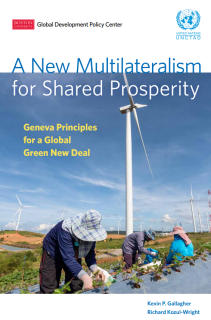
This report, A New Multilateralism for Shared Prosperity, synthesizes those efforts and advances a set of “Geneva Principles for a Global Green New Deal” that can form the foundations for a new multilateral trade and investment regime that has shared prosperity and sustainable development as its core goals.
We once had a version of multilateralism that permitted nations to regulate international markets and to pursue strategies for equitable prosperity and development. This system reflected the fact that leaders who believed in managed capitalism and full employment were put in charge after WWII. With their experience of the Great Depression and defeating fascism, they aimed for a valuedriven and rules-based global economy.
The system was far from perfect, yet its core principles did provide a rough template for a more balanced form of prosperity in a globally interdependent world. That system began to break down in the late 1970s, when giant global banks, corporations, and their allies in government regained the reins of power that they had temporarily lost in the Great Depression and the War. Once power was recaptured, these actors rewrote the rules of the global system. The system later became an instrument for the diffusion of a neo-liberal order that has triggered crises of financial instability, inequality, and climate change.
The “Geneva Principles for a Global Green New Deal” advances an urgent research and policy agenda for a New Multilateralism that rebuilds the rules of the global economy toward goals of coordinated stability, shared prosperity, and environmental sustainability, while deliberately respecting the space for national policy sovereignty.
Crafted in a series of workshops and consultations in late 2018 and early 2019, between the conveners and stakeholders from the global policy, advocacy, and research communities, the “Geneva Principles for a Global Green New Deal” advances a critique of the current multilateral system and articulates a set of goals and principles for its reform and regeneration.
